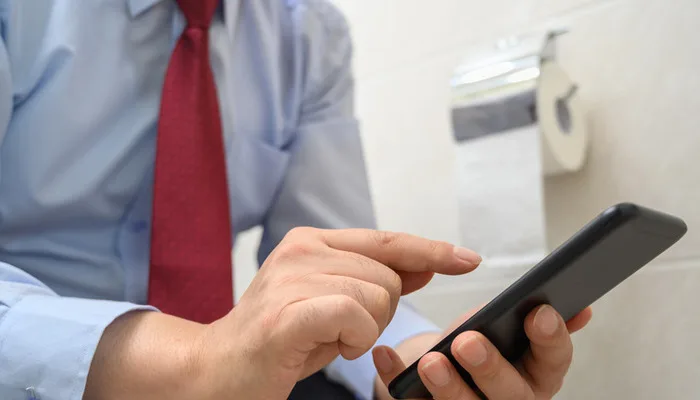
Hemorrhoids are swollen veins in the rectum and anus. They cause pain, itching, and bleeding. Many people get them, especially when they strain during bowel movements. Hard stools, obesity, and pregnancy raise the risk. But there’s another surprising cause you might not know about.
The Hidden Risk: Sitting Too Long on the Toilet
Dr. Joseph Salhab, a gastroenterologist, recently warned about a common habit that increases hemorrhoid risk. He says sitting too long on the toilet is harmful. This includes waiting too long to go or spending time on your phone while sitting there.
Research shows the longer you sit on the toilet, the worse hemorrhoids can get. Prolonged sitting puts extra pressure on your rectal veins. This pressure causes inflammation and pain.
Dr. Salhab also points out a hygiene issue. Using your phone on the toilet can spread bacteria. Phones carry germs that can lead to infections. He advises leaving your phone out of the bathroom or away from the toilet seat.
How to Avoid Hemorrhoids and Poop Easier
If you find it hard to poop or need to push hard, there are better ways to help your body.
First, add more fiber to your diet. Fiber softens stools and makes them easier to pass. Dr. Salhab recommends fruits like kiwi, dragon fruit, apples, pears, and prunes. These fruits also provide vitamin C, which supports digestion.
He suggests trying recipes like fruit salad or a smoothie bowl with dragon fruit and pineapple. These are tasty and fiber-rich choices.
Second, drink plenty of water every day. Staying hydrated helps keep stools soft. Dehydration makes stools hard and difficult to pass.
Read: Macron Reaffirms Support for Two-State Solution, Amid Gaza Strikes Killing 16 Civilians
Helpful Tools and Tips
Dr. Salhab recommends using a footstool or a device like a Squatty Potty. This tool changes your posture while sitting on the toilet. It mimics a squatting position, which can help relax your rectum and ease bowel movements.
If you still struggle, consider fiber supplements or magnesium oxide or citrate. These can support regular and easier pooping.
Most importantly, don’t delay going to the bathroom when you feel the urge. Holding it in can worsen constipation and hemorrhoids.
When to See a Doctor
Most hemorrhoids improve with diet and lifestyle changes. But if you have severe pain, bleeding, or long-term problems, see a healthcare provider. They can check for other conditions and recommend treatments.
Some cases may require medication or medical procedures to relieve symptoms.















